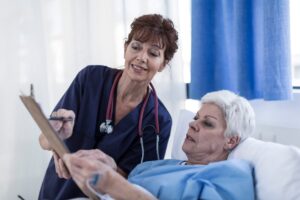Essential Gear for Mobile Healthcare Professionals
Are you a mobile healthcare professional who offers medical services in different locations? Then you must already know how fast-paced and demanding your job can be, whether you are doing travel nurse jobs, some family medicine jobs, specialized roles like interventional radiology jobs, or travel EKG tech jobs in mobile settings. As a travel nurse or healthcare professional, the right tools and devices can make all the difference in delivering optimal care to your patients when you are on the go.
Recently, a survey found out that more than half of respondents, 52% to be specific, believe that mobile health technologies have made healthcare more convenient for both patients as well as medical professionals. No wonder mobile health clinics in the U.S. are providing an average of almost 3,500 visits every year.
Mobile healthcare work, after all, is not just about having the right skills but also about having the right gear, which allows you to do your job efficiently and safely, no matter what the settings are like, whether that’s your patient’s cozy home, a mobile clinic, or a busy urgent care center. If you’re prepping to be a mobile healthcare professional, read along to find out the 10 tools you can’t work without and understand the importance of each to improve the patient care you offer without any added hassle.
1. Portable Ultrasound Machine
A portable ultrasound machine isn’t just nice to have; it’s essential for many mobile healthcare workers. This device lets you perform diagnostic imaging right where you are, saving both you and your patients time. It’s especially helpful for diagnosing pregnancy, musculoskeletal injuries, and even heart conditions without the need for patients to go to a hospital.
It will help you make quick, accurate diagnoses in any setting. Additionally, it saves time and reduces stress for patients by cutting out the need for additional appointments or referrals. Portable ultrasound machines also give you independence to provide more immediate care, which is especially important when you’re working with urgent cases.
2. Portable ECG/EKG Monitor
If you’re dealing with heart conditions or managing patients with arrhythmias, a portable ECG/EKG monitor is a game-changer. This tool gives you the ability to monitor heart rhythms on the go without being tethered to a hospital.
Using a portable ECG/EKG Monitor, you can capture heart data anywhere, which is key for diagnosing or monitoring cardiovascular issues. It also provides critical information in real time, helping you make faster decisions in patient care. Having one of these devices at your side gives you a huge advantage when working as a traveling cardiac nurse or in any mobile healthcare role requiring heart monitoring.
3. Mobile IV Equipment
For many mobile healthcare professionals, IV administration is a routine part of their job. Whether you’re hydrating a patient or delivering medications, having the right mobile IV kit ensures that you can do it safely and quickly. This setup is small, portable, and easy to use in any setting, which is perfect when you need to get fluids into a patient fast.
The best part is that it is easy to carry and set up, so you’re prepared for any IV-related procedure. You can treat patients faster and with more ease without needing to transport them to a hospital or clinic. In other words, mobile IV equipment is indispensable, especially for nurses who make home visits or provide long-term care.
4. Portable Oxygen Concentrators
Oxygen therapy is crucial for patients with respiratory issues, but transporting bulky equipment can be a pain. A portable oxygen concentrator changes all that. It’s small, lightweight, and lets you administer oxygen anywhere, whether you’re working in a patient’s home, on the road, or in a temporary clinic.
If you’re treating patients with chronic respiratory issues or patients needing constant oxygen aid, you can use portable oxygen concentrators to provide optimal care regardless of where they need it. It will also let you provide emergency oxygen support in urgent scenarios where every second counts, like respiratory distress.
5. Lightweight Blood Pressure Cuffs
Your patients’ vitals, including monitoring their blood pressure and pulse rate, are necessary for their assessment. It will help you decide the dosage of drugs you administer and the kind of treatment you give them. Having a demanding blood pressure measuring apparatus can add weight to your bag and consume more time. However, using a lightweight digital or mobile blood pressure cuff, you can easily monitor the heart health of your patients.
The best part is that they are pretty compact, reliable, and easy to use and transport. This means you can carry them with you wherever patients need you or your job takes you, be it your elderly patient’s apartment or a pop-up clinic in a rural setting.
6. Wearable Patient Monitoring Devices
As a travel nurse or mobile healthcare person, you can’t always be present at the bedside of all your patients. You might travel long distances before reaching one. So, how do you keep a tab on your patients’ vitals consistently in such cases? Have a wearable patient monitoring device and rest your worries.
These monitoring devices will track the vitals of your high-risk patients who need constant monitoring without you having to be physically present. They’ll help you with seeing their heart rate, oxygen concentration levels, and even their sleep cycle so you can make adjustments accordingly.
7. Portable Stethoscope
If you’re doing travel nurse jobs, you can’t skip having a lightweight, premium quality, portable stethoscope in your care bag at all times. This won’t just help you listen to heartbeats but also figure out how well your patients’ lungs are sounding, how their hearts are beating, and any other key signs that might signal a concerning medical event. All this while you’re on the go, serving patients in a wide variety of medical and non-medical settings.
In other wordings, a portable stethoscope will give you all the features without the added bulk. And since it’s compact but still high-performing, you won’t be sacrificing quality because of portability.
8. Nursing Shoes with Slip Resistance
Nursing shifts are anything but a cakewalk. You might be on your feet (quite literally) at a stretch. To be specific, sometimes you might be standing for as long as 8 hours to 12 hours, which is the average nursing shift time. As a mobile healthcare professional or nurse, you will be constantly moving from one patient to another, walking on different surfaces, some even wet or slippery. What can guarantee your safety and stability in this case is a comfortable pair of slip-resistant nursing shoes.
They’ll help you avoid slips and falls and feel comfortably supported in your arduous shifts whether you’re tending to patients in hospitals or elsewhere.
9. Mobile Communication Devices
As a travel nurse or healthcare professional, you might find staying in touch with your healthcare team necessary. It surely is! Having a reliable communication device can help you with that. It’s nothing too complex; you can use your smartphone, tablet, or a specialized communication device to stay connected with your patient’s entire care team and get updates instantaneously. This way, you can communicate directly with your patients and your colleagues and improve the care you offer.
10. Portable Electronic Health Record (EHR) Access
If you serve in a low-resource environment, which is mostly the case for mobile healthcare teams, you might not have a well-designed computer system to record and manage your patient’s data. However, you can use an EHR-integrated smartphone or tablet to record and periodically update their data. You can also communicate with other healthcare professionals tending to your patients using these portable EHR-integrated devices.
Wrap Up!
All in all, the gear you carry can prep you for success or make things worse for you as a healthcare professional who’s always on the go. It’s thus important that you go prepared wherever you go, whether you show up to provide emergency care in a compact building or offer routine diagnostics services in a mobile medical checkup device. Now that you know the essentials, wait no more to list out the items based on your unique job role and its requirements and invest in them to provide only the best care irrespective of location.
Check out these other great Staffdna articles

How to Succeed in Critical Care Nursing: Skills, Certifications & Opportunities
What if your ability to stay calm under pressure could mean the difference between life and death?

How to Achieve Locum Tenens Success
In the world of locum tenens, there are always lessons to learn — things to do and things to avoid — and whether you’re new or a veteran of locum tenens, you know that temporary assignments bring their fair share of challenges and opportunities.

Navigating Scope of Practice: What Advanced Practice Providers Can and Cannot Do
The demand for Advanced Practice Providers in the current healthcare centers cannot be overstated. The ability of these experts to diagnose, treat, and manage patient care capacities keeps increasing, especially with healthcare networks facing provider shortages.

How Advanced Practice Providers Improve Patient Outcomes
Advanced Practice Providers such as Nurse Practitioners, Physician Assistants, and Clinical Nurse Specialists are irreplaceable healthcare professionals.

The Growing Demand for Speech-Language Pathologists: Career & Salary Guide
Speech and language issues are more common than you may think. This problem is not only found in kids but also in elderly people and adults as well for many reasons.

Physicians vs. Advanced Practice: The Differences and Benefits
he healthcare system is ever evolving, and in it, providers of every type are specializing and becoming reliant on one another.
